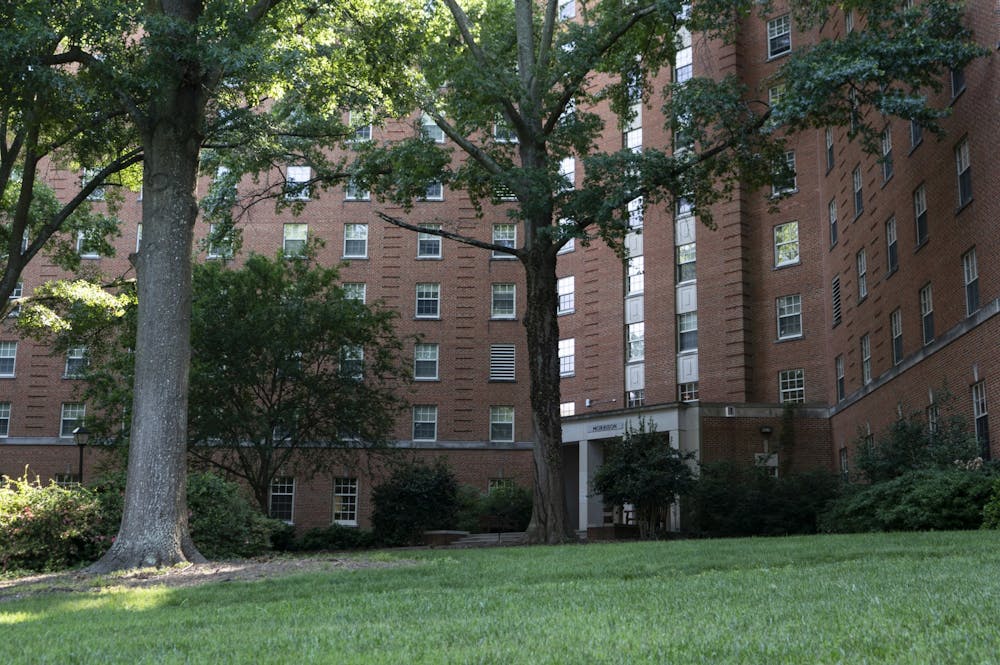Activists say they are not surprised.
Morrison Residence Hall is located on South Campus where Black students have historically been the majority, according to the dissertation project of Charlotte Fryar, who received her doctorate from UNC's Department of American Studies.
Morrison is described as an energetic supporter of higher education and an influential trustee on Carolina Housing's website. But he is historically known to be a leader among the Red Shirts, a white supremacist gang that intimidated Black North Carolinian voters in the 19th century, according to a News & Record article.
In April of 1900, The Charlotte News re-printed a portion of Morrison’s speech supporting a North Carolina state constitutional amendment meant to disenfranchise Black voters.
“The negro has not sense enough to vote," Morrison said. "He has no business in politics whatever, and I wish to the Lord I never could see another one of them vote.”
Later in the speech, Morrison said, "The white people of this state are going to rule, I tell you,” to an applauding audience.
In June, UNC's Board of Trustees voted to lift the 16-year moratorium on renaming campus buildings and announced the University Commission on History, Race and A Way Forward will be responsible for formal renaming recommendations.
As of October, the commission has officially suggested the re-naming of four buildings: Aycock Residence Hall, the Josephus Daniels Building, Carr Building and Ruffin Residence Hall.
The commission's published resolution on re-naming from July 10 states that the names of Aycock, Daniels, Carr and Ruffin warranted immediate action and that steps to rename other buildings would come in the future.
“We will make additional recommendations based on archival research and engagement with stakeholders on campus and in the broader community,” the resolution reads.
UNC Libraries has documented the Morrison Residence Hall's namesake's ties to white supremacy, according to a Carolina Alumni Review article. The article also lists other buildings connected to white supremacy, such as Cornelia James Spencer Residence Hall and John J. Parker Residence Hall, both of which have yet to be suggested for renaming.
Additionally, Names in Brick and Stone: Histories from UNC's Built Landscape, a research project by UNC Professor Anne Mitchell Whisnant and students, includes Morrison Residence Hall among buildings dedicated to white supremacists on campus.
To get the day's news and headlines in your inbox each morning, sign up for our email newsletters.
Julia Clark, activist and sophomore political science and African and African American diaspora studies major, said she does not think Morrison’s omission from the initial renaming process was an accident.
“There’s no gray area with Cameron A. Morrison — there’s no possibility of saying, ‘Oh he wasn’t a white supremacist,' or 'He didn’t mean it,'” Clark said. “But also, I’m not surprised. This University was built on white supremacy, will always continue to uphold white supremacy because of its foundation."
Clark said that after googling “Cameron A. Morrison UNC,” she clicked on the second result, which led her to a biographical page for Morrison, part of a UNC museum exhibit.
“It does not mention that he’s a white supremacist," Clark said. "It doesn’t mention that he terrorized Black people in North Carolina. It doesn’t mention any of that history that is essential. So what this tells me is that the University, even through its process of reckoning, in quotes, they will not stop upholding white supremacy.”
Lindsay Ayling, a doctoral candidate in UNC’s history department, said that Morrison’s name does not reflect the values that the campus aspires to have and leaving it on the residence hall is a celebration of racism.
“Having white supremacist monuments does nothing to actually educate people about history,” Ayling said. “It presents a false version of history because it glorifies figures who did tremendous harm in their lives.”
Ayling said she feels that UNC’s delay in renaming Morrison is a dog whistle to student activists to do the work of exposing the University’s white supremacist narrative.
“My persistent frustration with UNC is that they always seem to put pressure on student activists to do these campaigns and speak out individually against symbols of white supremacy,” Ayling said. “When students have to do that, it can be detrimental to their mental health and education, and a lot of the time it’s Black students that have to speak out against white supremacy.”
An anonymous source, who was a resident adviser at Morrison Residence Hall, said they did not learn about Morrison’s past until after they were an RA.
“It doesn’t surprise me, but it's unsettling that I was indirectly upholding white supremacy on campus,” the RA said. “Knowing UNC, this was probably purposeful, especially when so many minority students live on South (Campus).”
In an email to The Daily Tar Heel, James Leloudis, co-chairperson of the Commission on History, Race, and A Way Forward, elaborated on Morrison’s connections to the white supremacy campaigns of 1898-1900 in North Carolina and how Morrison often used his white supremacist roots as a part of his campaign for governor.
LeLoudis said Morrison has yet to be renamed because it is among a number of namesakes for campus buildings currently under review.
Regarding the review process, the commission takes time to review the history of each name. The review involves thorough archival research and investigation of the character and scope of alleged objectionable behavior. The commission then builds out a formal recommendation to send to the chancellor based on that review process.
Still, Morrison’s lack of name change makes Clark question the authenticity of the commission.
"It's extremely indicative that this University has no intention of creating a campus that has racial equity and creating a campus that is safe for Black students,” Clark said.
@cIaybmorris
university@dailytarheel.com



